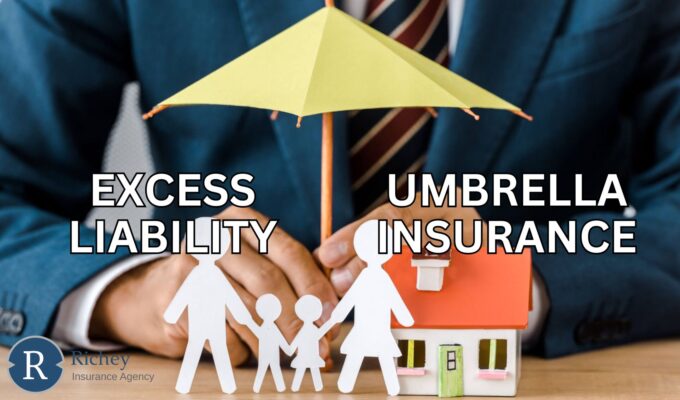
What is the difference between excess liability coverage and umbrella insurance? Quick answer: Excess liability coverage increases the limits of your existing policies, while umbrella insurance provides broader protection by covering additional risks beyond your standard policies.
Insurance is a safety net. It protects what you value most—your home, car, and savings. But sometimes, basic coverage isn’t enough. That’s where extra protection comes in. Extra protection can mean the difference between financial security and unexpected loss.
People often mix up excess liability coverage with umbrella insurance. It’s an easy mistake to make. They sound similar, and both offer extra protection. But they’re not the same. Understanding the difference is important. It could impact how well you’re covered when you need it most.
Excess liability coverage is an extra layer of protection that kicks in when your primary insurance reaches its limit. It adds more coverage to existing policies, such as home or auto insurance, without altering the terms of those policies. Essentially, it extends the coverage you already have, providing additional financial support in case of large claims.
For example, if you’re involved in a car accident and the damages exceed your auto insurance policy’s limit, excess liability coverage can help cover the remaining costs. However, it’s important to note that excess liability only applies to the specific policies it’s attached to and doesn’t cover new areas or risks. It’s designed to boost your existing coverage, not expand it to other types of incidents.
Umbrella insurance provides broader protection beyond your standard policies. It increases your liability limits and covers situations that regular insurance might not, more like a safety net that catches various risks, from defamation lawsuits to incidents involving rental properties.
For instance, if someone sues you for an accident on your property and the costs exceed your homeowner’s policy, umbrella insurance steps in. It also covers legal fees and other expenses not included in your primary policies. The key benefit is its wide-ranging protection, which can include coverage for incidents like slander or libel, offering peace of mind that your assets are well-guarded against unexpected threats.
Excess liability coverage and umbrella insurance both provide additional protection beyond standard insurance policies, but they differ in scope and application.
Excess liability coverage only extends the limits of your existing policies. It doesn’t cover new risks or areas. Umbrella insurance, on the other hand, not only increases your coverage limits but also provides protection for situations that might not be covered by your underlying policies, such as libel or slander.
Generally, umbrella insurance is broader, so it can be more expensive than excess liability coverage. However, the cost varies depending on the amount of coverage you need and the risk factors involved. For example, an umbrella policy might cost around $150-$300 annually for $1 million in coverage, whereas excess liability coverage might be cheaper but with limited benefits.
Umbrella insurance offers broader protection because it can cover multiple policies and different types of incidents. Excess liability coverage is limited to enhancing a specific policy, like your auto or home insurance.
Umbrella insurance provides broader protection. It not only raises the coverage limits but also covers additional risks that your basic policies might not. For instance, if you’re sued for defamation, an umbrella policy could cover legal costs, whereas excess liability might not.
Excess liability coverage is ideal if you want to increase the limits of an existing policy without adding new coverage areas. It’s particularly useful if you have high-value assets that you want to protect without paying for a comprehensive umbrella policy.
Common Professions or Activities That Might Require It:
Umbrella insurance is beneficial when you need broader protection across multiple policies and potential risks. For example, if you have significant assets or are at higher risk of being sued, an umbrella policy can provide peace of mind.
Types of People or Families Who Might Consider It:
In summary, excess liability coverage is best for increasing specific policy limits, while umbrella insurance is suited for those needing comprehensive, multi-policy protection. Your choice depends on your assets, risk exposure, and budget.
When deciding between excess liability coverage and umbrella insurance, consider your assets and lifestyle. Ask yourself if your current insurance limits are enough to cover a major incident. Think about your risk level—do you have significant assets that could be targeted in a lawsuit? If your job or hobbies expose you to higher risks, broader protection like umbrella insurance might be necessary.
Your choice also depends on how much coverage you need and how many areas of your life you want to protect. If you only need more coverage for specific policies, excess liability may be sufficient. But if you want comprehensive protection across multiple areas, umbrella insurance offers broader coverage. It’s important to consult with a trusted insurance provider, like Richey Insurance Agency, to help determine the best option based on your specific needs.
Richey Insurance Agency is the top insurance provider in Kingwood, known for offering a wide range of insurance solutions tailored to your needs.
We understand that every client’s situation is unique. That’s why we offer personalized service to help you choose the right coverage, whether it’s excess liability coverage, umbrella insurance, or standard policies.